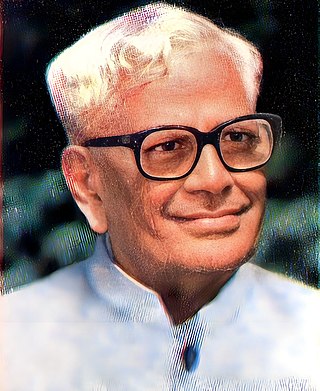
Ramaswamy Venkataraman was an Indian lawyer, Indian independence activist and politician who served as a Union Minister and as the eighth president of India. Venkataraman was born in Rajamadam village in Tanjore district, Madras Presidency. He studied law and practised in the Madras High Court and the Supreme Court of India. In his young age, he was an activist of the Indian independence movement and participated in the Quit India Movement. He was appointed as the member of the Constituent Assembly and the provisional cabinet. He was elected to the Lok Sabha four times and served as Union Finance Minister and Defence Minister. In 1984, he was elected as the seventh vice president of India and in 1987, he became the eighth President of India and served from 1987 to 1992. He also served as a State minister under K. Kamaraj and M. Bhaktavatsalam.
Trade unions in India are registered and file annual returns under the Trade Union Act (1926). Statistics on trade unions are collected annually by the Labour Bureau of the Ministry of Labour, Government of India. As per the latest data, released for 2012, there were 16,154 trade unions which had a combined membership of 9.18 million. The trade union movement in India is largely divided along political lines and follows a pre-Independence pattern of overlapping interactions between political parties and unions. The net result of this type of system is debated as it has both advantages and disadvantages. According to the data submitted by various trade unions to the Ministry of Labour and Employment as part of a survey, INTUC with a combined membership of 33.3 million, has emerged as the largest trade union in India as of 2013.
The Australian labour movement began in the early 19th century and since the late 19th century has included industrial and political wings. Trade unions in Australia may be organised on the basis of craft unionism, general unionism, or industrial unionism. Almost all unions in Australia are affiliated with the Australian Council of Trade Unions (ACTU), many of which have undergone a significant process of amalgamations, especially in the late 1980s and early 1990s. The leadership and membership of unions hold and have at other times held a wide range of political views, including communist, socialist and right-wing views.
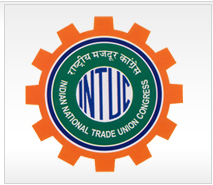
Indian National Trade Union Congress (INTUC) is a national trade union in India. It was founded on 3 May 1947 and is affiliated with the International Trade Union Confederation. According to provisional statistics from the Ministry of Labour, INTUC had a membership of 33.95 million in 2013, making it the largest Trade Union in India.

The All India Trade Union Congress (AITUC) is the oldest trade union federation in India. It is associated with the Communist Party of India. According to provisional statistics from the Ministry of Labour, AITUC had a membership of 14.2 million in 2013. It was founded on 31 October 1920 with Lala Lajpat Rai as its first president.
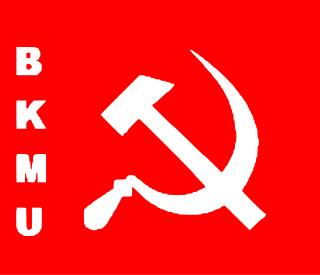
Bharatiya Khet Mazdoor Union literally 'Indian Land Workers Union' is a trade union of agricultural labourers in India. BKMU is politically tied to the Communist Party of India (CPI). BKMU is independent from both the main trade union central of CPI, the All India Trade Union Congress, as well as the farmers' organisation of CPI, the All India Kisan Sabha.

The Hind Mazdoor Sabha (HMS) was formed by the Socialists in 1948 but has little real connection with the Socialist Party. It is one of the least political and most pragmatic trade-union federations in India. The HMS is affiliated with the International Confederation of Free Trade Unions.

Dattatray Samant, also known as Datta Samant, and popularly referred to as Doctorsaheb, was an Indian politician and trade union leader, who is most famous for leading 200–300 thousand textile mill workers in the city of Bombay on a year-long strike in 1982, which triggered the closure of most of the textile mills in the city.
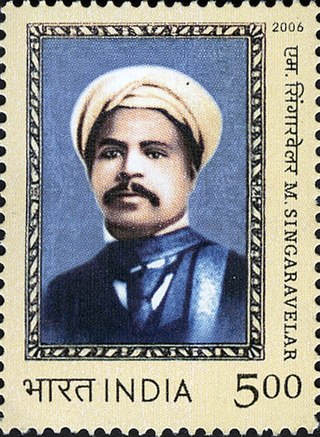
Malayapuram Singaravelu, also known as M. Singaravelu and Singaravelar, was a pioneer in more than one field in India. In 1918, he founded the first trade union in India. On 1 May 1923 he organised the first ever celebration of May Day in the country. Singaravelar was a major leader of the Indian independence movement, initially under the leadership of Gandhi, but later, joining the budding communist movement. In 1925, he became one of the founding fathers of the Communist Party of India; and chaired its inaugural convention in Kanpur. Though the British Government arrested him along with other leaders on charges of conspiring to wage war against the Crown, he was set free, soon after, on account of his failing health. Singaravelar was also a path-breaking social reformer who in his early life took to Buddhism, seeing it as a weapon against the evil of untouchability, which was particularly severe in the 19th-century India. He was also in the forefront of Self respect movement, in the Madras Presidency that fought for equal rights for backward castes. Though in his advanced years, he withdrew from active politics, Singaravelar remained a staunch advocate of the causes he had pioneered till his death at the age of 85.
Labour in India refers to employment in the economy of India. In 2020, there were around 476.67 million workers in India, the second largest after China. Out of which, agriculture industry consist of 41.19%, industry sector consist of 26.18% and service sector consist 32.33% of total labour force. Of these over 94 percent work in unincorporated, unorganised enterprises ranging from pushcart vendors to home-based diamond and gem polishing operations. The organised sector includes workers employed by the government, state-owned enterprises and private sector enterprises. In 2008, the organised sector employed 27.5 million workers, of which 17.3 million worked for government or government owned entities. The Human Rights Measurement Initiative finds that India is only doing 43.9% of what should be possible at its level of income for the right to work. Employees are routinely taken advantage of by their employers because of loose labour laws across all industries in India.
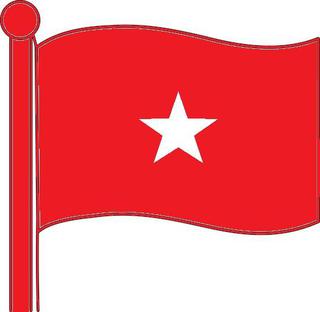
The Bolshevik Party of India is an Indian political party in India. The party was founded in 1939. The party had a certain role in the trade union movement in West Bengal and was briefly represented in the state government in 1969. In later years the party has played a negligible role in Indian politics.
The Great Bombay Textile Strike was a textile strike called on 18 January 1982 by the mill workers of Mumbai under trade union leader Dutta Samant. The purpose of the strike was to obtain a bonus payment and an increase in wages. Nearly 250,000 workers of 65 textile mills went on strike in Mumbai.

Indian labour law refers to law regulating labour in India. Traditionally, the Indian government at the federal and state levels has sought to ensure a high degree of protection for workers, but in practice, this differs due to the form of government and because labour is a subject in the concurrent list of the Indian Constitution. The Minimum Wages Act 1948 requires companies to pay the minimum wage set by the government alongside limiting working weeks to 40 hours. Overtime is strongly discouraged with the premium on overtime being 100% of the total wage. The Payment of Wages Act 1936 mandates the payment of wages on time on the last working day of every month via bank transfer or postal service. The Factories Act 1948 and the Shops and Establishment Act 1960 mandate 15 working days of fully paid vacation leave each year to each employee with an additional 7 fully paid sick days. The Maternity Benefit (Amendment) Act, 2017 gives female employees of every company the right to take 6 months' worth of fully paid maternity leave. It also provides for 6 weeks worth of paid leaves in case of miscarriage or medical termination of pregnancy. The Employees' Provident Fund Organisation and the Employees' State Insurance, governed by statutory acts provide workers with necessary social security for retirement benefits and medical and unemployment benefits respectively. Workers entitled to be covered under the Employees' State Insurance are also entitled to 90 days worth of paid medical leaves. A contract of employment can always provide for more rights than the statutory minimum set rights. The Indian parliament passed four labour codes in the 2019 and 2020 sessions. These four codes will consolidate 44 existing labour laws. They are: The Industrial Relations Code 2020, The Code on Social Security 2020, The Occupational Safety, Health and Working Conditions Code, 2020 and The Code on Wages 2019.
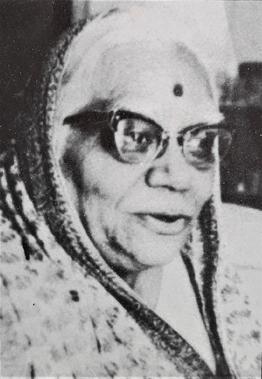
Maniben Kara (1905-1979) was an Indian social worker and trade unionist. She was a founder member of the Hind Mazdoor Sabha and served as its president. She was honoured by the Government of India in 1970 with Padma Shri, the fourth highest Indian civilian award.
Sudha Roy (1914–1987) was an Indian communist trade unionist and politician. She was a prominent leader of the Bengal Labour Party, the Bolshevik Party of India and later joined the Communist Party of India. She was one of the most prominent female leaders of the Bengali left.
Sisir Roy (1912–1960) was an Indian communist politician and trade unionist. He served as general secretary of the Bolshevik Party of India and the United Trade Union Congress, and was active in organizing dock workers in Calcutta.
The All India Railwaymen's Federation (AIRF) is the largest trade union of Indian Railways workers with a membership of 1.4 million. AIRF was founded on 16 February 1925. It is affiliated with the socialist trade union centre Hind Mazdoor Sabha.
All India Port and Dock Workers Federation (AIPDWF), founded in 1949 is the largest trade union representing workers at India's 12 major government-owned ports. It is affiliated with the socialist trade union center Hind Mazdoor Sabha.
The 2020 Indian general strike was a mass general strike that was held across India on 26 November 2020.









